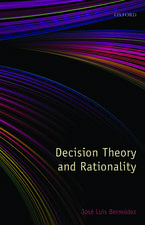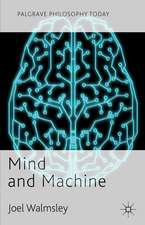What Is a Mind?: An Integrative Introduction to the Philosophy of Mind
Autor Suzanne Cunninghamen Limba Engleză Paperback – oct 2000
| Toate formatele și edițiile | Preț | Express |
|---|---|---|
| Paperback (1) | 151.37 lei 3-5 săpt. | |
| Hackett Publishing Company – oct 2000 | 151.37 lei 3-5 săpt. | |
| Hardback (1) | 346.50 lei 3-5 săpt. | |
| Hackett Publishing Company – oct 2000 | 346.50 lei 3-5 săpt. |
Preț: 151.37 lei
Preț vechi: 165.25 lei
-8% Nou
Puncte Express: 227
Preț estimativ în valută:
28.97€ • 30.06$ • 24.21£
28.97€ • 30.06$ • 24.21£
Carte disponibilă
Livrare economică 24 februarie-10 martie
Preluare comenzi: 021 569.72.76
Specificații
ISBN-13: 9780872205185
ISBN-10: 0872205185
Pagini: 288
Dimensiuni: 9 x 215 x 14 mm
Greutate: 0.25 kg
Editura: Hackett Publishing Company
Colecția Hackett Publishing Company, Inc (US)
ISBN-10: 0872205185
Pagini: 288
Dimensiuni: 9 x 215 x 14 mm
Greutate: 0.25 kg
Editura: Hackett Publishing Company
Colecția Hackett Publishing Company, Inc (US)
Recenzii
Suzanne Cunningham has produced a wonderful primer on all the major foundational questions being discussed in contemporary philosophy of mind, cognitive science and cognitive neuroscience. The mind-brain relation, the self, knowledge of other minds, the nature of consciousness, the emotions, and the prospects for artificial intelligence, receive complete, even-handed treatment from this experienced teacher's pen. Cunningham provides wonderful questions, exercises, research topics and bibliographical resources. I suspect many of her probing questions will engage professors as much as they will students. They did me. --Owen Flanagan, James B. Duke Professor of Philosophy, Duke University
A terrific introduction to Philosophy of Mind that moves gracefully from mainstream topics to others that are gaining attention in the field, yet are rarely broached in introductory texts: e.g., one chapter apiece devoted to emotions, evolution and animal (especially early hominid) minds, and theories of self. The book does a good job of integrating the empirical with the philosophical. . . . It is perhaps the most accessible introduction to the Philosophy of Mind currently available, an ideal book for people with little or no background in Philosophy. Terms that are unfamiliar or used in unfamiliar ways are clearly explained in boxed text. Theories such as functionalism are set in not just their philosophical contexts but also their broad intellectual and cultural milieus. I recommend the book enthusiastically. --Robert Gordon, University of Missouri-St. Louis
The book has several virtues. Overall, the writing is clear, the discussions are accurate, and the material does not presuppose any background philosophical knowledge. I was pleased and surprised to see a chapter on the emotions. For some reason that I do not understand, a discussion of the emotions does not play a significant role in introductory books in philosophy of mind. --Abraham Witonsky ,in Minds and Machines: The Journal for Artificial Intelligence, Philosophy, and Cognitive Science
A terrific introduction to Philosophy of Mind that moves gracefully from mainstream topics to others that are gaining attention in the field, yet are rarely broached in introductory texts: e.g., one chapter apiece devoted to emotions, evolution and animal (especially early hominid) minds, and theories of self. The book does a good job of integrating the empirical with the philosophical. . . . It is perhaps the most accessible introduction to the Philosophy of Mind currently available, an ideal book for people with little or no background in Philosophy. Terms that are unfamiliar or used in unfamiliar ways are clearly explained in boxed text. Theories such as functionalism are set in not just their philosophical contexts but also their broad intellectual and cultural milieus. I recommend the book enthusiastically. --Robert Gordon, University of Missouri-St. Louis
The book has several virtues. Overall, the writing is clear, the discussions are accurate, and the material does not presuppose any background philosophical knowledge. I was pleased and surprised to see a chapter on the emotions. For some reason that I do not understand, a discussion of the emotions does not play a significant role in introductory books in philosophy of mind. --Abraham Witonsky ,in Minds and Machines: The Journal for Artificial Intelligence, Philosophy, and Cognitive Science

















